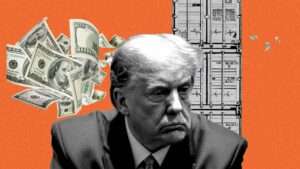The Volokh Conspiracy
Mostly law professors | Sometimes contrarian | Often libertarian | Always independent
Trump Administration Makes Damaging Admissions on Alien Enemies Act and Deportations
Trump admits he could return migrant illegally deported to El Salvador. And an intelligence community report concludes the Tren de Aragua drug gang isn't controlled by the Venezuelan government.

In recent days, the Trump Administration has made two damaging admissions that should hurt its already dubious positions in litigation over the Alien Enemies Act and illegal deportations of migrants to imprisonment in El Salvador.
Last week, Trump himself publicly admitted he "could" secure the return of illegally deported Salvadoran immigrant Kilmar Abrego Garcia, who is currently imprisoned in El Salvador at the behest of the US government. That should put an end to the ongoing legal debate over how to apply the Supreme Court's ruling that the administration must "facilitate" Abrego Garcia's return. Given that Abrego Garcia is only incarcerated by El Salvador because of an agreement under which the US is paying the Salvadoran government to do so, it was already obvious that Trump could easily secure his return, if he wanted to. But Trump's admission is additional evidence on this point. And, given that the entire arrangement is an unconstitutional violation of the Due Process Clause of the Fifth Amendment (deportees are imprisoned without ever having any opportunity to defend themselves in court), there is no legitimate foreign policy interest in maintaining it, and therefore no reason for courts to defer to the executive. And what is true of Abrego Garcia is also true of dozens of others illegally deported to imprisonment in El Salvador. It is blatantly obvious that Trump could easily return them, and the administration has a legal and moral obligation do so.
Trump did later claim he could only return Abrego Garcia if the attorney general says its legal to do so. But there is no doubt that it's legal to return a person whose deportation was itself illegal.
Meanwhile, a declassified US intelligence community memorandum concluded that, contrary to Trump Administration claims, the Tren de Aragua drug gang is not acting under the direction of the Venezuelan government and is not significantly responsible for the flow of Venezuelan migrants to the US. Reason writer Jacob Sullum has a helpful summary of the memo and its significance:
In a March 15 proclamation, President Donald Trump declared that suspected members of the Venezuelan gang Tren de Aragua were "alien enemies" subject to immediate deportation. He invoked the Alien Enemies Act (AEA), a rarely used, 227-year-old law that applies when "there is a declared war" between the United States and a "foreign nation or government" or when a "foreign nation or government" has "perpetrated, attempted, or threatened" an "invasion or predatory incursion against the territory of the United States."
To support that dubious interpretation of the AEA, Trump averred that Tren de Aragua (TDA) is "is closely aligned with" the Venezuelan government. He said the gang was "undertaking hostile actions and conducting irregular warfare against the territory of the United States…at the direction, clandestine or otherwise, of the Maduro regime in Venezuela." A newly revealed memo from the National Intelligence Council (NIC) casts doubt on those assertions….
The declassified April 7 memo, which the Freedom of the Press Foundation obtained under the Freedom of Information Act, says "Maduro regime leadership probably sometimes tolerates TDA's presence in Venezuela, and some government officials may cooperate with TDA for financial gain." But it adds that "the Maduro regime probably does not have a policy of cooperating with TDA and is not directing TDA movement to and operations in the United States."
The U.S. intelligence community, which includes the CIA, the FBI, and the National Security Agency, "bases this judgment on Venezuelan law enforcement actions demonstrating the regime treats TDA as a threat," the memo says, describing "an uneasy mix of cooperation and confrontation" rather than the "top-down directives" that characterize "the regime's ties to other armed groups."
This revelation undercuts Administration claims that TdA's actions are at the behest of the Venezuelan government, and therefore undermines the argument those activities are undertaken by a "foreign nation or government," which is one of the requirements for using the AEA to detain and deport immigrants.
Trump's use of the AEA is illegal for other reasons, as well. Among other things, regardless of who controls TdA, the gang's illegal activities do not qualify as an "invasion" or "predatory incursion" - as multiple federal courts have now ruled. I have defended the view that "invasion" requires a military attack, in detail in previous writings on the meaning of the term in the AEA and the Constitution. But the intelligence community report further weakens the Administration's legal position.


Show Comments (109)